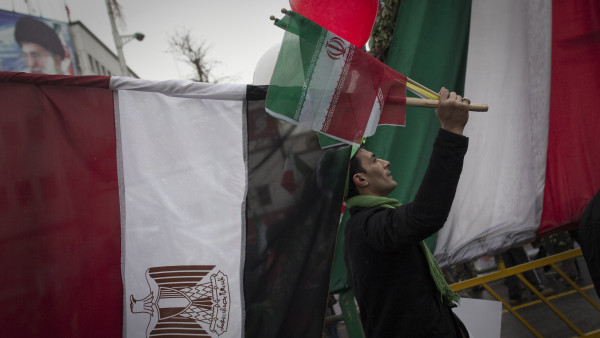Tehran’s relations with Cairo have been fraught since the ousting of Iran’s Shah Mohammad Reza Pahlavi in the 1979 Islamic revolution and Egypt’s peace treaty with Israel the same year. [Getty]
The Egyptian government expressed on Monday its sincere condolences to the people of Iran for the “tragic death” of Iranian President Ebrahim Raisi and other senior officials in a helicopter crash a day earlier.
In a brief statement, Presidential Spokesman Ahmed Fahmy expressed President Abdel Fattah al-Sisi’s support and solidarity with the Iranian leadership and people during this difficult time.
Egypt’s Foreign Minister Sameh Shoukry mourned his Iranian counterpart, Hossein Amir-Abdollahian, Raisi, and the other senior officials who lost their lives in the incident.
“May God have mercy on the deceased and their companions and grant their families and the…Iranian people patience and solace,” Shoukry said.
It remains unclear whether Sisi or any senior official will represent Egypt later at the funeral in Iran.
Raisi had expressed his willingness to better ties with Egypt, which has long viewed Iran as a security threat for allegedly aiding Islamist and militant groups, including Hezbollah, the Palestinian Hamas faction ruling Gaza, Islamic Jihad, and other armed groups.
Bilateral talks, sponsored mainly by Iraq, have been underway for over a year to re-establish official ties between the two regional forces.
Tehran’s relations with Cairo have been fraught since the ousting of Iran’s Shah Mohammad Reza Pahlavi in the 1979 Islamic revolution and Egypt’s peace treaty with Israel the same year, making it the only Arab country that has not had an embassy in Tehran since that period.
The Shah’s subsequent refuge in Egypt, then under the rule of President Anwar Sadat, worsened relations. Mohammad Reza Pahlavi died in 1980 in Egypt and was buried there.
“The Egyptian successive regimes have long been concerned about the possible spread of Shiaism in Sunni-dominated Egypt, though the religious minority has marginalised and persecuted in the country for decades,” a prominent political analyst told The New Arab.
On the other hand, Israel’s objection to Egypt being an ally of Iran is believed to have been another stumbling block to the reconciliation process given Tehran’s nuclear programme, the sanctions imposed on it by the US, and its hostility with Tel Aviv, with whom Egypt has a peace treaty.
“The tension between Cairo and Tel Aviv has recently grown after Israel’s ground invasion of [the neighbouring] Palestinian Rafah City, which poses a threat to Egypt’s national security, could be in Tehran’s best interest,” argued the analyst, who requested to remain anonymous for security reasons.
“Politicians have different equations, and for them, the Machiavellian rule of ‘the enemy of my enemy is my friend’ mostly counts,” the analyst added.
Egypt and Iran briefly restored ties in 2012 after the election of the Muslim Brotherhood’s Mohammed Morsi as Egyptian president, ousted a year later by the then-defence minister Sisi.
Morsi’s official visit to Tehran in August 2012 was the first by an Egyptian leader to Iran since the end of the Shah’s reign. While Morsi declared his opposition to Iran’s ally, Syrian President Bashar al-Assad, for brutally crushing the uprising against his rule, the visit was nevertheless a success.
He and then-Iranian President Mahmoud Ahmadinejad agreed to reopen embassies in each other’s capitals. Ahmadinejad reciprocated by visiting Cairo in February 2013. Direct flights were established between Tehran and Cairo the following month, another first since the Iranian Revolution.


